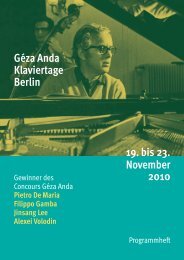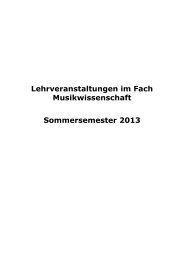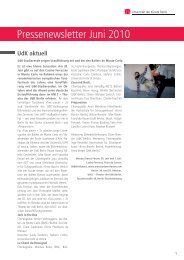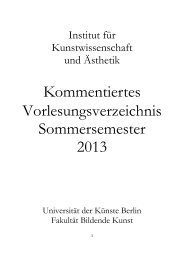The Meaning of Music in a German Sect in Chile Colonia Dignidad
The Meaning of Music in a German Sect in Chile: Colonia Dignidad
The Meaning of Music in a German Sect in Chile: Colonia Dignidad
- No tags were found...
Create successful ePaper yourself
Turn your PDF publications into a flip-book with our unique Google optimized e-Paper software.
<strong>The</strong> <strong>Mean<strong>in</strong>g</strong> <strong>of</strong> <strong>Music</strong> <strong>in</strong> a <strong>German</strong> <strong>Sect</strong> <strong>in</strong> <strong>Chile</strong>: <strong>Colonia</strong> <strong>Dignidad</strong><br />
By Susanne Bauer<br />
After read<strong>in</strong>g Lia Rejane's column about Easter Island, about secrets and musical traditions <strong>of</strong> this wonderful<br />
culture, I felt <strong>in</strong>spired to show another face <strong>of</strong> music and culture <strong>in</strong> <strong>Chile</strong>. It is perhaps the most violent contrast<br />
to Lia’s excursion, but it is worth be<strong>in</strong>g mentioned as it shows, how our feel<strong>in</strong>gs toward music are conditioned by<br />
life circumstances and how music can be misused to cause damage and destruct personality on one side, and<br />
used to survey and resist, on the other.<br />
<strong>Music</strong> <strong>in</strong> Early Childhood<br />
S<strong>in</strong>ce research started about musical dialogue <strong>in</strong> <strong>in</strong>fant-mother relationship, we know that music is a potent<br />
element <strong>in</strong> early childhood which <strong>in</strong>fluences affective and cognitive development, as well as social relation (Jaffe<br />
et al. 2001; Malloch, 1999/2000; Papousek, 1981; Trevarthen, 2002). It contributes to the two big needs <strong>of</strong><br />
human be<strong>in</strong>g: <strong>in</strong>dividualism and togetherness (Kerr & Bowen, 1988). A sound is able to connect you with<br />
yourself or with others, you may listen to your own voice or to the voice <strong>of</strong> others, to a piece <strong>of</strong> music on your<br />
own or shar<strong>in</strong>g an auditive experience with others. <strong>The</strong> way, how adults speak to a child and relate musically to<br />
it, <strong>in</strong>fluences the organization <strong>of</strong> bra<strong>in</strong> functions, emotion and language. Personality development is also<br />
connected to musical <strong>in</strong>fluence <strong>in</strong> the widest sense <strong>of</strong> the word: s<strong>in</strong>ce earliest experiences <strong>of</strong> our mothers' voice<br />
(s<strong>of</strong>t, hard, slow, rapid, paused, quick, fluid, etc), through the "family music", (mean<strong>in</strong>g the way how we relate<br />
vocally: who is the director <strong>of</strong> the orchestra, the solo player, the bass, the viol<strong>in</strong> etc.) and the predom<strong>in</strong>ant music<br />
<strong>of</strong> our culture. Children take the music <strong>of</strong> their parents, which give them a solid ground for personal and family<br />
identity, but they may let this music or <strong>in</strong>clude new sounds when they are <strong>in</strong> need <strong>of</strong> differentiation (Ruud, 1998).<br />
What happens when the experience <strong>of</strong> sound and music is manipulated, with a deprived choice determ<strong>in</strong>ed by<br />
one person?<br />
<strong>Colonia</strong> <strong>Dignidad</strong> - Colony <strong>of</strong> Honour<br />
<strong>Colonia</strong> <strong>Dignidad</strong> (CD), today "Villa Baviera", was a <strong>German</strong> community <strong>of</strong> 300 people, women, men and<br />
children, which arrived <strong>in</strong> the South <strong>of</strong> <strong>Chile</strong> <strong>in</strong> 1961. What was "sold" as a Benefit Organisation, became a<br />
religious sect, a close system and a place <strong>of</strong> crime. <strong>German</strong> journals and newspapers <strong>in</strong>formed about sexual<br />
abuse, physical and psychological violence and even torture aga<strong>in</strong>st the members <strong>of</strong> the group, accus<strong>in</strong>g his<br />
leader, Paul Schäfer as ma<strong>in</strong> responsible and some <strong>of</strong> his men as collaborators (Gemballa, 1989; Heller, 1993,<br />
2006; Vedder, 2005). In spite <strong>of</strong> these early publications noth<strong>in</strong>g was done aga<strong>in</strong>st Paul Schäfer, the opposite<br />
happened, while members <strong>of</strong> <strong>Colonia</strong> <strong>Dignidad</strong> lost their identities and were more and more repressed with all<br />
k<strong>in</strong>d <strong>of</strong> methods, he became more and more power.<br />
My First Impression<br />
S<strong>in</strong>ce I was <strong>in</strong>terested <strong>in</strong> <strong>Chile</strong> I knew about <strong>Colonia</strong> <strong>Dignidad</strong> and had read all these stories about Paul Schäfer<br />
and his sect. <strong>The</strong>refore, once <strong>in</strong> <strong>Chile</strong>, we decided to go to the restaurant that belonged and still belongs to<br />
<strong>Colonia</strong> <strong>Dignidad</strong>, a 100 km away from their territory, which, by the way, is about 14.000 ha. My feel<strong>in</strong>gs were<br />
mixed between curiosity and fear. <strong>The</strong> restaurant was much known <strong>in</strong> the region for the quality <strong>of</strong> the food and<br />
the nice surround<strong>in</strong>gs <strong>of</strong> the place. <strong>Chile</strong>ans like to go there on weekend with the whole family to enjoy a good<br />
lunch or d<strong>in</strong>ner and relax <strong>in</strong> a very beautiful landscape. Once a day, some <strong>of</strong> the <strong>German</strong>s transform <strong>in</strong>to actors<br />
and present a show, tell<strong>in</strong>g jokes and mak<strong>in</strong>g the audience laugh. I admit, I could not laugh, as I felt that<br />
someth<strong>in</strong>g was wrong with it, too bizarre and strange. <strong>The</strong>se <strong>German</strong>s where def<strong>in</strong>itively very different: from the<br />
phenomenological po<strong>in</strong>t <strong>of</strong> view, their way <strong>of</strong> dress<strong>in</strong>g, brush<strong>in</strong>g and speak<strong>in</strong>g. Like <strong>German</strong>s from the 30th, cut<br />
<strong>of</strong>f a book and put <strong>in</strong> the South <strong>of</strong> <strong>Chile</strong>. <strong>The</strong>re was no congruence feel<strong>in</strong>g and I did not understand why <strong>Chile</strong>an
appreciated all this so much. May be, they liked it, because <strong>German</strong>s are supposed to be different, but not bad.<br />
<strong>German</strong>s arrived <strong>in</strong> the 19th century as colonists, build<strong>in</strong>g up houses, <strong>in</strong>troduc<strong>in</strong>g <strong>German</strong> culture and education<br />
<strong>in</strong> some parts <strong>of</strong> the south <strong>of</strong> <strong>Chile</strong>. <strong>The</strong>y were very recognized people, as they were strong, busy and honest.<br />
Everybody knew that they spoke more <strong>German</strong> than Spanish and that they did not like to mix so much with the<br />
<strong>Chile</strong>an people. Young <strong>German</strong> people were supposed to marry a <strong>German</strong> partner. Even the fact that a lot <strong>of</strong><br />
them followed radical political ideas <strong>in</strong> the thirties, that is declare themselves as Nazi or forbid Spanish language<br />
to their children and <strong>in</strong> <strong>German</strong> schools as a sign <strong>of</strong> adherence to racist ideas, would not change the op<strong>in</strong>ion <strong>of</strong><br />
most <strong>Chile</strong>an people. So, nobody seemed to have doubts about the good <strong>in</strong>tention <strong>of</strong> <strong>Colonia</strong> <strong>Dignidad</strong>. How<br />
could they? <strong>Colonia</strong> <strong>Dignidad</strong> built up a Hospital attend<strong>in</strong>g thousands <strong>of</strong> poor people and a school only for<br />
<strong>Chile</strong>an children. Everybody was grateful, with exception <strong>of</strong> those <strong>Chile</strong>an mothers or families, most <strong>of</strong> them<br />
analphabets, who brought their children to the hospital and who never saw them aga<strong>in</strong>, as they "agreed" to<br />
give their children <strong>in</strong> adoption to <strong>German</strong> families. <strong>Chile</strong>an babies grew up <strong>in</strong> the <strong>German</strong> colony without never<br />
learn<strong>in</strong>g Spanish language or gett<strong>in</strong>g to know their biological mothers and fathers (Vedder, 2005). - I never went<br />
back to that place but would not forget it either.<br />
Fifteen Years Later ...<br />
I never returned to that place, even after settl<strong>in</strong>g down <strong>in</strong> <strong>Chile</strong>. But, as life is full <strong>of</strong> surprises, 15 years later, <strong>in</strong><br />
2005, as a <strong>German</strong> psychologist, I was <strong>in</strong>vited to jo<strong>in</strong> the psychotherapeutic team to help and assist victims <strong>of</strong><br />
CD! Why then? <strong>The</strong> leader <strong>of</strong> the group, Paul Schäfer, was persecuted by <strong>Chile</strong>an justice and escaped <strong>in</strong> 1997.<br />
<strong>The</strong> <strong>German</strong> government f<strong>in</strong>ally decided to visit the place, which was not allowed before, and to get to know the<br />
"Colonos". <strong>The</strong>y wanted to <strong>in</strong>form about the real situation and <strong>of</strong>fered assistance and help to everybody who<br />
wanted. One <strong>of</strong> the tasks was the renovation <strong>of</strong> <strong>German</strong> passports and other documents. Not everybody wanted<br />
their help as they felt like betray<strong>in</strong>g the leader. <strong>The</strong> loyalty was still so strong, even if they did not know where<br />
Paul Schäfer was and what would happen with them when <strong>Colonia</strong> <strong>Dignidad</strong> disappeared. In their eyes, people<br />
from outside where bad people which they must not trust, because they did not believe <strong>in</strong> God. Only some <strong>of</strong><br />
them contacted us immediately and told us their horrendous stories. <strong>The</strong>y were our first patients and the first to<br />
go back to <strong>German</strong>y one year later.<br />
Why and How: A <strong>German</strong> <strong>Sect</strong> <strong>in</strong> the South <strong>of</strong> <strong>Chile</strong>?<br />
<strong>Colonia</strong> <strong>Dignidad</strong> was a sect with all the rules dur<strong>in</strong>g 40 years. Beside mental and emotional repression, bra<strong>in</strong><br />
wash<strong>in</strong>g and oppression, children and young men suffered sexual abuse by the leader. Most <strong>of</strong> the boys were<br />
victims dur<strong>in</strong>g more than 20 years <strong>of</strong> Paul Schäfer’s paedophilic homosexual abnormal conduct (Sal<strong>in</strong>as, 2006).<br />
Paul Schäfer was a self-proclaimed spiritual leader <strong>in</strong> the fifties. In a little <strong>German</strong> town called Heide, he started<br />
his malign work with adults, children and young men and women. He was very successful <strong>in</strong> recruit<strong>in</strong>g people<br />
and thanks to his charismatic appearance and his religious discourses, many <strong>of</strong> the still wounded souls <strong>of</strong> exiled<br />
<strong>German</strong> families, fall <strong>in</strong>to his cha<strong>in</strong>s. When <strong>German</strong> justice accused him because <strong>of</strong> paedophilic practice, he<br />
escaped with a group <strong>of</strong> people to Belgium; from there he organized the immigration to a far away country,<br />
called <strong>Chile</strong>. He promised a better life, announc<strong>in</strong>g an important social mission that was to help poor children<br />
and adults, promot<strong>in</strong>g religious ideas, education and health to them. His group was with him. Most <strong>of</strong> them left<br />
Heide and arrived 1961 <strong>in</strong> <strong>Chile</strong>. Others had to stay <strong>in</strong> <strong>German</strong>y, especially fathers and husbands. <strong>The</strong>y had to<br />
help organiz<strong>in</strong>g f<strong>in</strong>ancial tasks. <strong>The</strong> real reason was the plan to separate families as soon as possible, with the<br />
<strong>in</strong>tention to put <strong>in</strong>to practice his sexual necessities. Most <strong>of</strong> the elder people where so conv<strong>in</strong>ced that they gave<br />
all their money to Schäfer or even sold their houses to help with the project. He promised them to pay back the<br />
money once they would have an <strong>in</strong>come <strong>in</strong> <strong>Chile</strong>. This moment never arrived – CD became very rich, but nobody<br />
never ever received a salary until 2005, the same year, when Paul Schäfer was captured <strong>in</strong> Argent<strong>in</strong>a, where he<br />
stayed hidden dur<strong>in</strong>g more than seven years, <strong>in</strong> a luxurious farmhouse located <strong>in</strong> a big territory, accompanied by<br />
five "Colonos".
<strong>The</strong> story <strong>of</strong> <strong>Colonia</strong> <strong>Dignidad</strong> lasted about 40 years, years <strong>of</strong> oppression, bra<strong>in</strong>wash<strong>in</strong>g, sexual abuse <strong>of</strong> children,<br />
punishments, psychical and physical torture, separation <strong>of</strong> families, brothers, sisters, boys and girls. <strong>Colonia</strong><br />
<strong>Dignidad</strong> functioned with pear groups for age and sex, each group with its own name. Each group had to obey to<br />
an adult, who had to watch out for control and order, with the <strong>in</strong>struction to punish whenever it was necessary.<br />
Like <strong>in</strong> all sects, the <strong>in</strong>dividual wishes were elim<strong>in</strong>ated. Work, praise and punishment were used to constitute a<br />
hermetic system. In case one <strong>of</strong> them tried to escape, he/she was punished so hard that he/she would not try it<br />
aga<strong>in</strong>. <strong>The</strong>re is some exception, like Wolfgang Kneese who tried three times until he succeeded. He founded an<br />
organization called "Flügelschlag" <strong>in</strong> <strong>German</strong>y to help victims <strong>of</strong> <strong>Colonia</strong> <strong>Dignidad</strong> until today.<br />
<strong>The</strong> separation between men and women was significant, on one side, it meant isolation, a limited and distorted<br />
sexual evolution and abnormal conducts <strong>in</strong> children. On the other hand, it affected the population <strong>of</strong> CD:<br />
between 1982 and 2000 no children were born. Sexual relation and marriage where forbidden. Those who<br />
opposed to this rule were severely punished, isolated or drugged. Some time the victim was shut away <strong>in</strong> the<br />
Hospital dur<strong>in</strong>g months. People who suffered this k<strong>in</strong>d <strong>of</strong> oppression still do not remember certa<strong>in</strong> periods <strong>of</strong><br />
their life.<br />
Well, what about music? How can person play music <strong>in</strong> these same conditions?<br />
Power <strong>of</strong> <strong>Music</strong> – Power through <strong>Music</strong><br />
<strong>Music</strong> played a very important role dur<strong>in</strong>g all these years <strong>of</strong> oppression. People related to us that it had different<br />
functions. On one side, music helped them to th<strong>in</strong>k on positive aspects, it was a part <strong>of</strong> their education and<br />
stimulated their <strong>in</strong>tellectual development. <strong>The</strong>y learned about composers, different pieces and <strong>in</strong>terpreters.<br />
Almost all <strong>of</strong> them grew up play<strong>in</strong>g an <strong>in</strong>strument, receiv<strong>in</strong>g group classes <strong>in</strong> viol<strong>in</strong>, trumpet, horn, fagot, and<br />
other classical <strong>in</strong>struments. So far so good; but when we asked more about this topic, we could realize that even<br />
with music the leader achieved his malign purposes. Let me give some examples: children were asked which<br />
<strong>in</strong>strument they would like to play. When they said "viol<strong>in</strong>", he or she would learn any other <strong>in</strong>strument but the<br />
viol<strong>in</strong>. When they discussed, they were punished immediately or later on at the group meet<strong>in</strong>g. <strong>The</strong>ir will was<br />
broken as soon as possible. Children and young musicians were not supposed to play better than adults, so<br />
children with special aptitudes received fewer classes or had classes with others, who were on a lower level,<br />
obligated to "wait for them". It was forbidden to show any emotion while play<strong>in</strong>g, as well as to show pride or<br />
ambition. This was very hardly punished. <strong>The</strong>re was one girl, D., with special musical aptitudes. <strong>The</strong>y told us that<br />
dur<strong>in</strong>g 10 years they used to have an <strong>in</strong>vited orchestra director from <strong>German</strong>y. This man came regularly dur<strong>in</strong>g<br />
summertime and studied very difficult pieces with the orchestra. He gave D. a special role, e.g. a solo part <strong>of</strong> a<br />
concert. Paul Schäfer did not like that at all, as she was younger than others, and forbid her to do this aga<strong>in</strong>.<br />
When the same director proposed to take D. to <strong>German</strong>y so that she could realize viol<strong>in</strong> studies at the<br />
conservatory, Paul Schäfer decided to take her <strong>of</strong>f the orchestra and led her without play<strong>in</strong>g the viol<strong>in</strong>.<br />
Alone While Together<br />
<strong>Music</strong> was also used to separate people: every day, after lunch and after d<strong>in</strong>ner, they had to practice on their<br />
<strong>in</strong>struments, <strong>in</strong>dividually. This made it almost impossible to have a space <strong>of</strong> time to relate to each other directly,<br />
without control and without be<strong>in</strong>g observed. <strong>Music</strong> was used to silence them. In spite <strong>of</strong> promot<strong>in</strong>g togetherness,<br />
it produced more and more isolation. In the orchestra and <strong>in</strong> the choir they stand together and played or sang<br />
together, but they did not watch each other, they had to face straight on to the director. This is a cruel way <strong>of</strong><br />
be<strong>in</strong>g together without be<strong>in</strong>g together, without connection, without empathy between them. <strong>The</strong>y were<br />
educated to hate and to betray each other. How could they play music together without confidence to each<br />
other? <strong>The</strong>y were educated do denounce the other, they were not allowed to listen to the other or keep any<br />
secret, otherwise they were punished; the one was punished who listened to the other. How could they play<br />
together? <strong>The</strong>y were not expected to enjoy their music. Paul Schäfer loved Pagan<strong>in</strong>i and Caruso. He did not<br />
support "Liebesleid and Liebesfreud" from Kreisler. He hated titles and music who spoke about love. What are<br />
the men, they had to s<strong>in</strong>g and participate <strong>in</strong> the choir. Paul Schäfer was the director. He chose the repertoire, no
love songs were permitted. From one day to the other he changed rhythms and melodies. <strong>The</strong> one who did not<br />
follow his new arrangements was punished and blamed <strong>in</strong> front <strong>of</strong> everybody else. <strong>The</strong> worst punish was to be<br />
excluded and to sit down on a bank beside him, sometime dur<strong>in</strong>g weeks without participat<strong>in</strong>g. <strong>The</strong>y felt guilty<br />
and blamed. Which healthy and strong personality can develop from such k<strong>in</strong>d <strong>of</strong> experience?<br />
<strong>Music</strong> as a Hang Out<br />
<strong>The</strong> choir and the orchestra where utilized for social events, every time the CD community wanted to<br />
demonstrate a happy <strong>German</strong> family life, they had to perform. <strong>The</strong> public consists on specially <strong>in</strong>vited neighbours,<br />
sometimes on men <strong>of</strong> politics or military people. <strong>The</strong> <strong>in</strong>tention was to give a good impression or receive some<br />
advantage or special permission. <strong>The</strong>y played <strong>German</strong> and <strong>Chile</strong>an music, s<strong>in</strong>g<strong>in</strong>g <strong>Chile</strong>an songs <strong>in</strong>clusive the<br />
National Hymn. Every time the auditory applauded immediately after the performance, Paul Schäfer enraged.<br />
Why? Because the musicians were <strong>in</strong>structed to s<strong>in</strong>g and play <strong>in</strong> such a deep way, that at the end <strong>of</strong> the music,<br />
nobody should move. <strong>The</strong> applause meant that they did not succeed this effect, he shouted to them furiously as<br />
soon as the public disappeared.<br />
When Paul Schäfer escaped from <strong>Colonia</strong> <strong>Dignidad</strong>, on 1997, and years later, when the habitants realized that<br />
he would not come back, most <strong>of</strong> them led their <strong>in</strong>struments, feel<strong>in</strong>g unable to go on play<strong>in</strong>g <strong>in</strong> the orchestra.<br />
When asked, they did not even know the answer. I suggest that only then, they felt that the <strong>in</strong>strument<br />
represented oppression and obligation, a conditioned life and robotic conduct - not to play brought them a new<br />
sensation <strong>of</strong> liberty.<br />
Improvisation?<br />
I tried to have a few music therapy group sessions with some <strong>of</strong> them. Of course, the idea <strong>of</strong> "Free<br />
Improvisation" did not work at all. <strong>The</strong>y just could not play any tone without feel<strong>in</strong>g <strong>in</strong>sure and helpless. In an<br />
Improvisation there is no structure, no base where to lead on. <strong>The</strong>re was no sense-<strong>of</strong>-Self prepared to articulate a<br />
s<strong>in</strong>gle tone on his/her own. One <strong>of</strong> them asked me to play some "real song" and to accompany him while<br />
s<strong>in</strong>g<strong>in</strong>g arias. <strong>The</strong>n they begged me to play on the piano a strong rhythm, so they could follow me. <strong>The</strong>y liked<br />
that very much! <strong>The</strong>y recognized their need <strong>of</strong> dependency and even laughed about it – but would not like to try<br />
improvis<strong>in</strong>g aga<strong>in</strong>. I then started a new way to relate me with them through music: prepar<strong>in</strong>g presentations<br />
about famous musicians, <strong>Chile</strong>an or <strong>German</strong> compositors and <strong>in</strong>terprets and tell<strong>in</strong>g about their lives. So we had<br />
the authoritarian and ambitious father <strong>of</strong> Beethoven, Anne Sophie Mutters way <strong>of</strong> dress<strong>in</strong>g and present<strong>in</strong>g<br />
herself <strong>in</strong> a concert and her warm and empathic attitude towards others, Robert Schumann’s and Clara Wieck’s<br />
life as a couple, Claudio Arrau’s arriv<strong>in</strong>g <strong>in</strong> Berl<strong>in</strong> as a child to study piano and so on – we started talk<strong>in</strong>g about<br />
these little arguments and sometimes, the discussion ended up <strong>in</strong> a very carefully expressed critical look at their<br />
own lives. <strong>The</strong>y appreciate very much my performance; they were so much used to listen to the leader and<br />
admitted how difficult it was to give an op<strong>in</strong>ion, to pronounce the word: I th<strong>in</strong>k.<br />
With all, most <strong>of</strong> them felt that the music was a very important part <strong>of</strong> their lives, some <strong>of</strong> them were sad<br />
because the orchestra stopped, others felt a great relieve. <strong>The</strong> letter expressed that music always helped them to<br />
support difficult moments, act<strong>in</strong>g as a life jacket, as an anchor, as a detractor and a connection to the world.<br />
Although they were never allowed to speak to the public, at least they could see other people and compare<br />
themselves with them. More than one <strong>of</strong> them must have felt the difference and questioned the dogma about<br />
good and bad human be<strong>in</strong>gs.<br />
F<strong>in</strong>ale<br />
While habitants from Easter Island where s<strong>in</strong>g<strong>in</strong>g their beautiful melodies, <strong>in</strong> the same land at the same time,<br />
thousands <strong>of</strong> km away, the habitants <strong>of</strong> "CD Island" where s<strong>in</strong>g<strong>in</strong>g their songs, follow<strong>in</strong>g the perverted ideas<br />
and <strong>in</strong>terpretations <strong>of</strong> a perverted soul. Even worth: on one <strong>of</strong> these past days, a <strong>Chile</strong>an woman was deta<strong>in</strong>ed<br />
and tortured <strong>in</strong> CD. Dur<strong>in</strong>g the procedure, she had to listen to Tchaikovsky’s "Capriccio Italiano" aga<strong>in</strong> and aga<strong>in</strong>
(Gemballa, 1998). She survived and told her story, but will she ever forget this melody and what they did to her,<br />
while music was go<strong>in</strong>g on?<br />
We cannot blame music for hatred. <strong>Music</strong> doesn't create hatred, it can only support a hatred that is already there<br />
(Moreno, 1999, p. 13).<br />
Reference<br />
Gemballa, G (1998). <strong>Colonia</strong> <strong>Dignidad</strong>: e<strong>in</strong> Reporter auf den Spuren e<strong>in</strong>es deutschen Skandals. Frankfurt:<br />
Campus Verlag.<br />
Heller, P. (1993). Von der Psychosekte zum Folterlager. Stuttgart: Schmetterl<strong>in</strong>g Verlag.<br />
Heller, P. (2006). Lederhosen, Dutt und Giftgas. Stuttgart: Schmetterl<strong>in</strong>g Verlag.<br />
Jaffe, J., Beebe, B., Feldste<strong>in</strong>, S., Crown, C.L., & Jasnow, M.D. (2001). Rhythms <strong>of</strong> dialogue <strong>in</strong> <strong>in</strong>fancy.<br />
Monographs <strong>of</strong> the Society for Research <strong>in</strong> Child Development 66(2 Serial N°265).<br />
Kerr, M. E. & Bowen, M. (1988). Family Evaluation. New York: W. W. Norton & Co.<br />
Malloch S. (1999/2000). Mothers and <strong>in</strong>fants and communicative musicality. <strong>Music</strong>ae Scientiae, Special Issue:<br />
Rhythm, <strong>Music</strong>al Narrative and Orig<strong>in</strong>s <strong>of</strong> Human Communication, 29-58.<br />
Moreno, J. (1999). Orpheus <strong>in</strong> Hell: <strong>Music</strong> and <strong>The</strong>rapy <strong>in</strong> the Holocaust. <strong>The</strong> Arts <strong>in</strong> Psychotherapy 26(1), 3-14.<br />
Papousek, M. (1981). Die Bedeutung musikalischer Elemente <strong>in</strong> der frühen Kommunikation zwischen Eltern und<br />
K<strong>in</strong>d. Sozialpädiatrie <strong>in</strong> Praxis und Kl<strong>in</strong>ik 3(10), 468-473.<br />
Ruud, E. (1998). <strong>Music</strong> <strong>The</strong>rapy: Improvisation, Communication & Culture. Gilsum, NH: Barcelona Publishers.<br />
Sal<strong>in</strong>as, C. & Stange, H. (2006). Los Amigos del "Dr" Schäfer. Santiago, <strong>Chile</strong>: Debate.<br />
Trevarthen, C (2002). Orig<strong>in</strong>s <strong>of</strong> <strong>Music</strong>al Identity: Evidence from Infancy for <strong>Music</strong>al Social Awareness. In: R. Mac<br />
Donald, D. Hargreaves, & D. Miell (Eds.), <strong>Music</strong>al Identities (pp. 21-37). Oxford: Oxford University Press.<br />
Vedder, E. (2005). Weg vom Leben. Berl<strong>in</strong>: Ullste<strong>in</strong>.<br />
To cite this page:<br />
Bauer, Susanne (2009). <strong>The</strong> <strong>Mean<strong>in</strong>g</strong> <strong>of</strong> <strong>Music</strong> <strong>in</strong> a <strong>German</strong> <strong>Sect</strong> <strong>in</strong> <strong>Chile</strong>: <strong>Colonia</strong> <strong>Dignidad</strong>. Voices: A World<br />
Forum for <strong>Music</strong> <strong>The</strong>rapy. Voices: A World Forum for <strong>Music</strong> <strong>The</strong>rapy. Retrieved May 26, 2009, from<br />
http://www.voices.no/columnist/colbauer200409.php


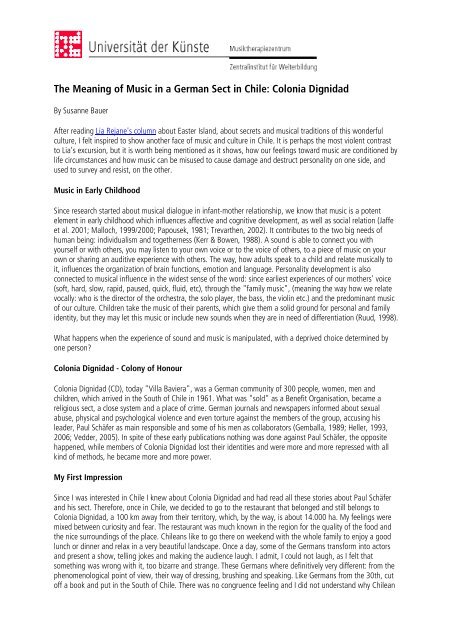

![aufstellung [PDF] - Universität der Künste Berlin](https://img.yumpu.com/53290563/1/184x260/aufstellung-pdf-universitat-der-ka-1-4-nste-berlin.jpg?quality=85)

